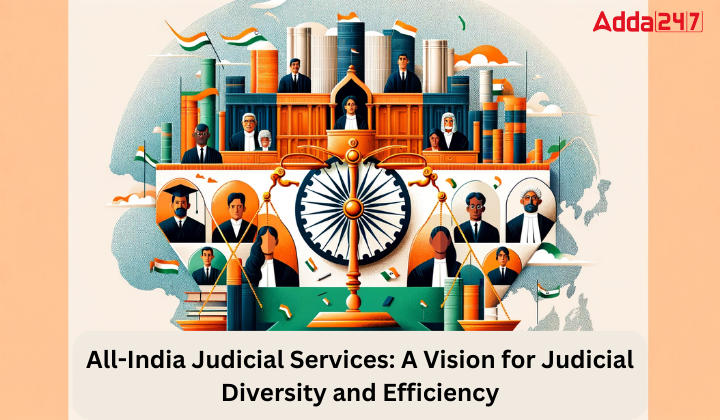Table of Contents
The call for an “All India Judicial Service” (AIJS) by President Droupadi Murmu marks a significant moment in India’s judicial history. Her speech at the Supreme Court’s Constitution Day celebration highlighted the need for a more diverse and efficient judiciary, rekindling the debate on a centralized system for recruiting judges. This article delves into the concept of AIJS, its history, proposed benefits, challenges, and the reasons behind its delayed implementation.
Historical Context and the Need for AIJS
The idea of an AIJS isn’t novel; it was first discussed in the Law Commission’s 1958 report. The rationale addressed varying standards in the subordinate judiciary, discrepancies in pay and remuneration across states, delays in filling vacancies, and the need for uniform training.
Law Commission Reports
The Law Commission revisited this idea in its 1978 report, which focused on a backlog of cases in lower courts. Subsequently, the Parliamentary Standing Committee on Personnel, Public Grievances, Law, and Justice in 2006 supported the AIJS concept, proposing a draft bill.
Supreme Court’s Involvement
The Supreme Court, in the All India Judges’ Association (1) v. UOI case (1992), directed the Center to establish AIJS. However, a 1993 review left the initiation to the Center’s discretion. In 2017, the Supreme Court proposed a “Central Selection Mechanism” for district judge appointments, suggesting a common examination to replace separate state exams.
All-India Judicial Service Overview
What is the All India Judicial Service?
AIJS, akin to the Indian Administrative Service (IAS) or Indian Police Service (IPS), envisages a centralized system to select judges for the lower judiciary. It aims to streamline the recruitment process, ensuring a uniform standard nationwide.
Divergence from the Current System
Currently, states have their recruitment processes, leading to variations in standards and delays. The AIJS proposes a uniform, central examination, and then individual High Courts (HCs) conduct interviews based on merit lists.
Constitutional Provisions: Articles 233 and 234
These articles empower state governments to appoint judges in consultation with the High Courts. AIJS, while aligning with these provisions, seeks to centralize the initial stages of recruitment.
Benefits of All-India Judicial Service
Ensuring Judicial Diversity
President Murmu’s emphasis on diversity underscores AIJS’s potential to bring inclusivity to the judiciary. This system could offer opportunities to marginalized groups, fostering a judiciary that mirrors the diverse fabric of Indian society.
Standardization and efficiency
Centralized recruitment promises uniform standards and potentially quicker filling of vacancies. This standardization can lead to a more competent judiciary capable of addressing the enormous backlog of cases.
Challenges and Roadblocks
Constitutional and Administrative Hurdles
About India’s federal structure, the centralization that AIJS proposes walks a fine line. Balancing central oversight with state autonomy remains contentious, especially in judicial appointments.
Different Opinions Among Stakeholders
The lack of consensus among major stakeholders, including state governments and high courts, impedes the implementation of AIJS. Concerns range from reservations about centralization to the specifics of the recruitment process.
Path to Implementation
Despite various steps by the Center, like the 2012 comprehensive proposal and discussions at Chief Justice Conferences, consensus remains elusive. The divergent views among states and HCs and constitutional considerations have stalled the AIJS’s progress.
2017 Initiatives and Continued Deliberations
In 2017, aspects like eligibility, age, selection criteria, and reservations were discussed, but no concrete steps were taken toward implementation.
Former Union Law Minister Kiren Rijiju’s admission of a lack of consensus in 2023 further highlights the ongoing challenges.
Conclusion- A Vision Awaiting Realization
AIJS represents a transformative vision for India’s judiciary, promising efficiency, uniformity, and diversity. However, its journey from concept to reality is fraught with constitutional, administrative, and consensus-building challenges. The debate continues, reflecting the complexities of balancing central oversight with federal autonomy in a diverse and democratic nation like India.
As the country grapples with these challenges, the AIJS remains a beacon of hope for a more efficient and representative judiciary. The road ahead is uncertain, but the potential benefits of AIJS make it a pursuit worth undertaking for the betterment of India’s judicial system.



 TSPSC Group 1 Question Paper 2024, Downl...
TSPSC Group 1 Question Paper 2024, Downl...
 TSPSC Group 1 Answer key 2024 Out, Downl...
TSPSC Group 1 Answer key 2024 Out, Downl...
 UPSC Prelims 2024 Question Paper, Downlo...
UPSC Prelims 2024 Question Paper, Downlo...




